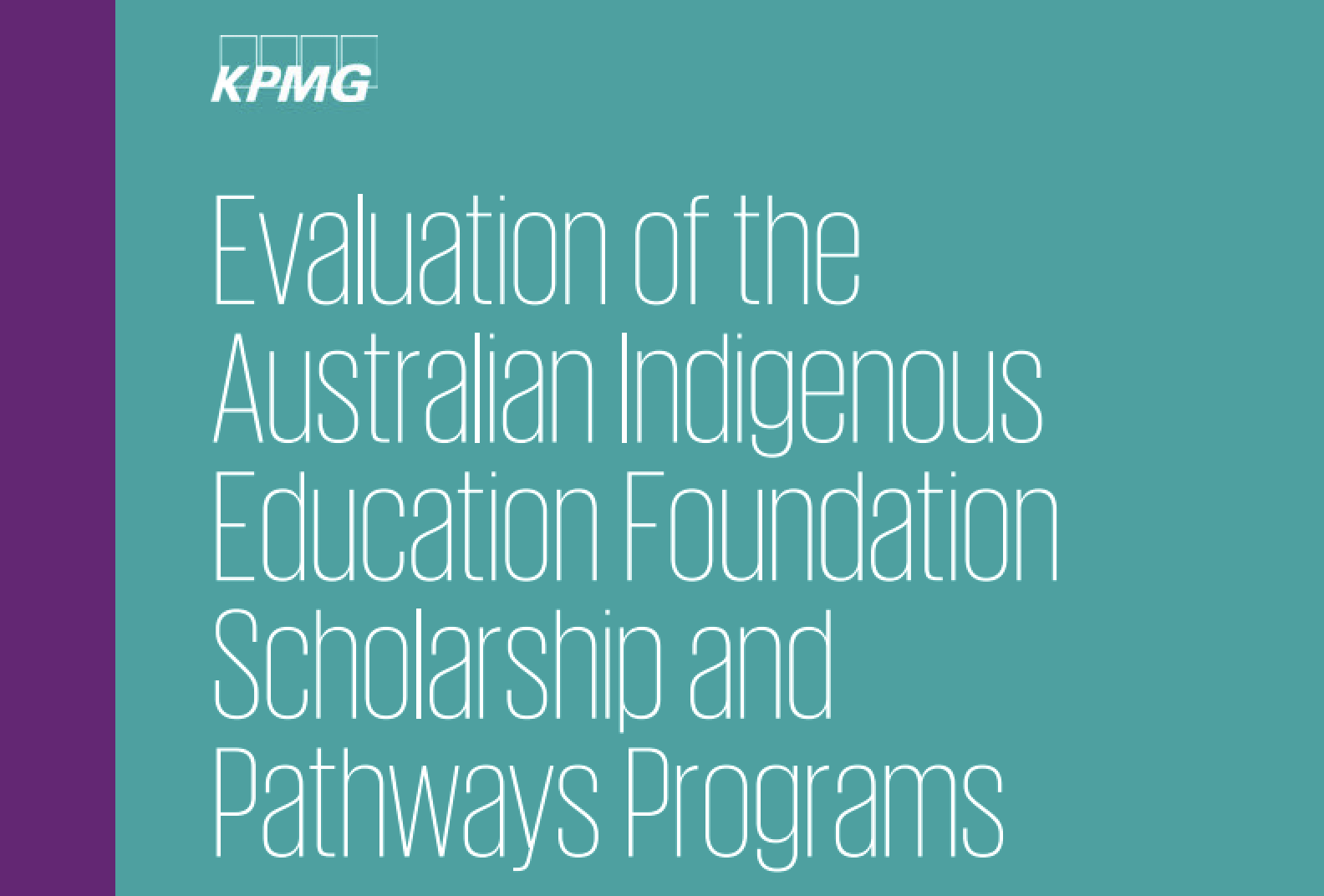The Australian Indigenous Education Foundation (AIEF) is pleased to release a detailed independent external evaluation report undertaken by KPMG.
KPMG’s
Evaluation of the Australian Indigenous Education Foundation Scholarship and Pathways Programs uses the substantial amount of data collected by AIEF over the past decade to measure performance and inform the evaluation, and details the outcomes and impact of AIEF’s programs for individual students, their families, schools and the wider community.

KPMG’s key findings outlined in the AIEF Evaluation Report which is available to download below, include:
1. Economic and social return of $9.31 for every $1 invested: The programs provide value for money, with each dollar invested into the programs generating benefits of $9.31 over the working lifetime of participants. Importantly, these benefits only reflect the monetisable impacts of AIEF. The program also delivers a range of other benefits.
2. Retention and completion consistently above 90%: AIEF Scholarship and AIEF Tertiary Scholarship Students are achieving AIEF benchmarks of 90 per cent annual retention and completion.
3. AIEF students 2.3 times more likely to complete Year 12: AIEF Scholarship Students are estimated to be 2.3 times more likely to complete Year 12 than the Indigenous population overall.
4. AIEF Year 12 graduates four times as likely to go to university: For those completing Year 12, students under the AIEF Program are more than four times as likely to enter into university education than the Indigenous population overall.
5. 93% of AIEF Year 12 Alumni are productively engaged after graduation: Most AIEF Alumni have successfully transitioned into further study or employment.
6. 97% of AIEF Tertiary Alumni are employed: Almost all AIEF Tertiary Alumni are employed (97 per cent).
7. Remote students have the highest success rate: The highest success rate of 96 per cent was achieved by students from remote home communities.
8. Highest employment from remote and very remote communities: The highest proportion of AIEF Alumni in employment are from remote and very remote home locations.
9. Higher wages for AIEF Alumni: All employment pathways under the AIEF Program are associated with higher average annual wages compared to the average for the Indigenous population.
10. Financial barriers insurmountable without
AIEF:
The AIEF Scholarship Program reduces the financial barriers
for students to attend participating boarding schools. For the majority
of AIEF Scholarship Students, these financial barriers are likely to be
insurmountable without AIEF.
11. Household income below $40,000 for largest
share of AIEF families:
The largest share of AIEF Scholarship
Students’ families contributed $400 a year to school fees, indicating that
household income was $40,000 or below per year.
12. Median household income $60,000 to $80,000 bracket for AIEF families: Based on parental contributions , the median household income for AIEF families in 2018 was in the $60,000 to $80,000 bracket.
13. Positive impacts on leadership and confidence: AIEF Alumni expressed that the program activities also had positive impacts on their leadership skills and confidence.
14. Ripple effect: Another impact of AIEF Programs for students, communities or schools included ripple effects within Indigenous families, as involvement in the AIEF Program inspired other family members to seek out similar opportunities.
15. AIEF works effectively in the Indigenous education ecosystem: AIEF is able to work effectively within the ecosystem of Indigenous education to broaden sources of funding from schools, volunteers and private organisations to facilitate educational access to high performing schools and improve the lifetime social and economic wellbeing of participants.
KPMG’s independent evaluation is the most detailed and
rigorous evaluation report AIEF has ever seen for an Indigenous program. It provides a robust and independent evidence
base to demonstrate that the AIEF Scholarship and Pathways Programs are
achieving the intended educational and employment outcomes for Indigenous young
people whilst also achieving a valuable economic and social return for
investment.
A summary of KPMG’s independent evaluation report is available here, and the detailed report is available here.


